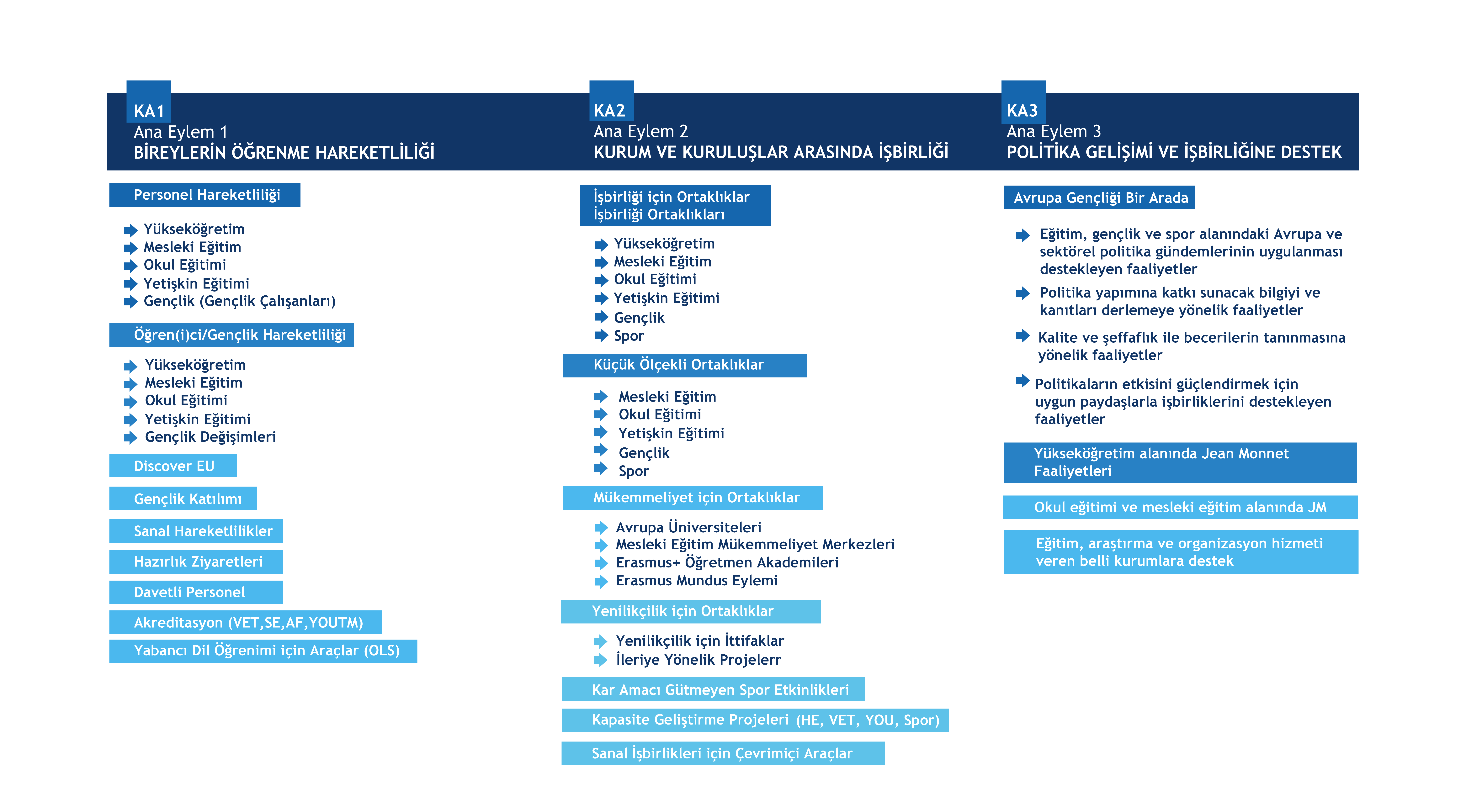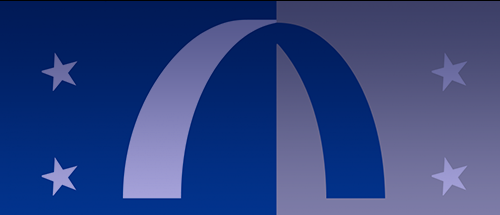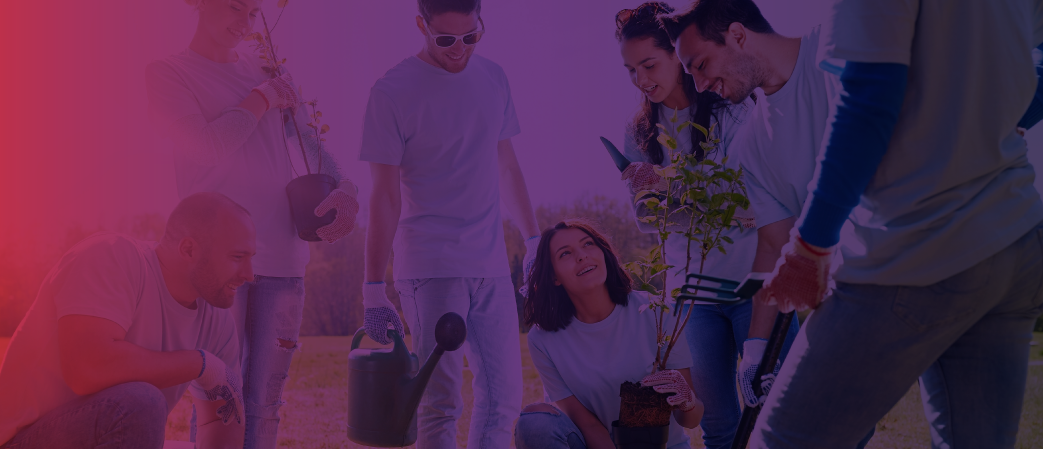DIGITAL EUROPE PROGRAMME

The Digital Europe Programme is a new financing programme with a total budget of 7,5 billion € that will be implemented by the EU in the 2021-2027 period, focusing on building strategic digital capacities across Europe and expanding the use of digital technologies.
Türkiye’s Participation in the Programme
Negotiations between Türkiye and the European Commission has been completed and the association agreement is expected to be signed soon. The national coordination of the programme is carried out by the Presidency Digital Transformation Office and the Ministry of Industry and Technology in Türkiye. Türkiye is expected to participate in programme as of 2023.
Targets of the Programme
Supporting and accelerating the digital transformation of the European economy, industry and society,
Enabling EU citizens, public institutions and businesses to benefit from digital transformation.
Ensuring the competitiveness of the EU in the global digital economy.
Reducing the EU's external dependence on digital technologies and infrastructures and ensuring its strategic autonomy,
Supporting the usage of digital technologies widely within all parts of the Union.
Priority Areas for the Programme
Within the scope of the program, the establishment of critical digital infrastructures in the fields of High Performance Computing, Artificial Intelligence, Data and Cyber Security and the development of strategically important innovative digital technologies will be supported. In the second stage, it is aimed to make the established infrastructures and digital technologies accessible to SMEs, public institutions and citizens and to expand their use. In this context, five specific objectives have been determined:
Specific Objective 1: High Performance Computing
Specific Objective 2: Artificial Intelligence
Specific Objective 3: Cybersecurity and Trust
Specific Objective 4: Advanced Digital Skills
Specific Objective 5: Deployment, Best Use of Digital Capacity and Interoperability
Would you like to learn more?
Digital Europe Programme Regulation for the period 2021-2027
Click here to access the file of Frequently Asked Questions about the Programme.
Click here. for Digital Europe work programmes.
To access the Digital Europe Programme open calls, you can visit the Funds and Tenders Portal web-site.
Follow Us on Social Media!
Dijital Avrupa Programı programa katılım müzakereleri devam etmektedir. Ancak 2023 yılında sözleşmesi imzalanan çağrılara katılım sağlanabilecektir.
TEK PAZAR PROGRAMI

Tek Pazar Programı Nedir?
Tek Pazar Programı, 2014-2020 döneminde uygulanan 14 farklı Birlik programını bünyesinde toplayan bir çatı program niteliğindedir. 3 Mayıs 2021 tarihinde yayımlanan tüzüğüyle 2021-2027 döneminde toplam 4,21 milyar avro bütçeye sahip olduğu tescillenen Tek Pazar Programı’nın genel hedefi, daha esnek, şeffaf, basitleştirilmiş ve dirençli bir çerçeve oluşturarak, AB’nin iç pazarının sürdürülebilir ve etkin şekilde işleyişinin sağlanmasıdır. Ayrıca, başta küçük ve orta ölçekli işletmeler (KOBİ) olmak üzere sanayide rekabetçiliğin desteklenmesi, insan, hayvan ve bitki sağlığının gözetilmesi, hayvan varlığının ve çeşitliliğinin korunması, istatistik kapasitesinin geliştirilmesi hedeflenmektedir.
Ülkemizin Programa Katılımı
Türkiye’nin Programa resmi katılı için Avrupa Komisyonu ile müzakereler devam etmektedir.
Programın bileşenleri nelerdir?
- Girişimciliğin ve KOBİ’lerin Desteklenmesi -–KOSGEB
- Tüketicinin Korunması ve Ürün Güvenliği – Ticaret Bakanlığı
- Gıda Güvenliği – Tarım ve Orman Bakanlığı
- İstatistik – TÜİK
- Standardizasyon – TSE
- İç Pazar – Ticaret Bakanlığı
Ülkemiz, 2002 yılından bu yana kesintisiz olarak KOBİ’lere ilişkin AB programlarına katılım sağlamakta olup, tüketicinin korunmasına ilişkin AB programına ilk olarak 2002-2006 döneminde katılım sağlamıştır. 2014-2020 döneminde İşletmelerin ve KOBİ’lerin Rekabet Edebilirliği Programı’na (CoSME Programı) katılım sağlanmıştır.
Program’a katılım müzakereleri 11 Kasım 2021 tarihinde başlamıştır. Program’a resmi katılım süreci kapsamında Komisyon’dan alınan taslak anlaşmaya ilişkin müzakereler ilgili kurumlarımızın katılımıyla AB Başkanlığı koordinasyonunda devam etmektedir.

ODAK ALANLARI

Gıda Güvenliği
- Hayvan hastalıklarını ve bitki zararlılarını önlemeyi, kontrol altına almayı ve yok etmeyi amaçlar. Sürdürülebilir gıda üretimi ve tüketimini destekler.
- Hayvan refahının iyileştirilmesini destekler.
- Resmî kontrollerin etkinliğini, verimliliğini ve güvenilirliğini artırır.
Araçlar:
- Gıda ve yeme ilişkin Hızlı Uyarı Sistemi (RASFF)
- AB referans laboratuvarları ve referans merkezleri
- Acil durum önlemlerinin finansmanı
- Gıda ve yem, hayvan sağlığı ve bitki sağlığı alanında yetkili makamlara eğitim

Tüketicileri Koruma
- Piyasadaki ürünlerin güvenli olmasını ve tüketicilerin kuralları bilmesini sağlar.
- Ulusal yetkililerin birlikte verimli bir şekilde çalışmasına ve hızlı bir şekilde iletişim kurmasına yardımcı olur.
Araçlar:
- Tehlikeli ürünler için Güvenlik Kapısı
- AB çapındaki yasa dışı uygulamalarla mücadele etmeye yönelik Tüketicinin Korunması işbirliği ağı (örn. yanıltıcı reklam kampanyaları)
- Örneğin, internetten alışveriş yaparken yaşanan sorunların çözülebileceği Avrupa Tüketici Merkezleri
- Tüketicilerin anlaşmazlıkları mahkeme dışında çözmelerine yardımcı olan Çevrim İçi Uyuşmazlık Çözümü platformu

Rekabet Gücü
Özellikle KOBİ’ler olmak üzere işletmelere çeşitli destek biçimleri sağlar:
- InvestEU Fonu kapsamındaki hibeler ve KOBİ kredi garantileri gibi finansal destekler sunar.
- Pazarlara erişimi kolaylaştırır ve idari yükü azaltır.
- Yeniliğin yükselişini destekler ve küresel ve toplumsal zorlukları ele alır.
- Elverişli bir iş ortamı ve girişimcilik kültürünü teşvik eder.
Araçlar:
- KOBİ’lere uluslararası alanda yenilik yapmaları ve büyümeleri konusunda bütünleşik bir tavsiye paketi sunan İşletme Avrupa Ağı
- InvestEU Fonu’na ait “KOBİ Penceresi” altında borç ve öz kaynak finansmanı
- Gelişmiş araçlar ve kapasite geliştirme sayesinde ulusal makamlarla güçlendirilmiş uygulamalar ve işbirliği

Etkili Bir Tek Pazar
Mevcut kuralları uygular ve şirket ve sözleşme hukuku, kara para aklamayla mücadele ve sermayelerin, malların ve hizmetlerin serbest dolaşımı dahil olmak üzere söz konusu alanlarda bunları daha da geliştirir.
Finansal hizmetlerin tüketicilerin, sivil toplumun ve son kullanıcıların ihtiyaçlarını karşılamasını sağlar.
Dijital ekonomide rekabet kurallarını etkili bir şekilde uygulamanın yanında Üye Devlet yetkilileriyle işbirliğini güçlendirmek ve geliştirmek için Komisyon’un araçlarını ve uzmanlığını geliştirmenin savunuculuğunu yapar.
Tek Pazar’ın sahada daha iyi çalışması için kamu alıcılarının vatandaşların paraları için daha iyi değer elde etmelerine yardımcı olur.
Araçlar:
- Vatandaşlar ve şirketler için çevrim içi yönetim hizmetleri sunan Tek Dijital Ağ Geçidi
- Yetkililer arasında bilgi alışverişi için İç Piyasa Bilgi Sistemi
- Vatandaşlar ve işletmelere yönelik sorun çözme ağı SOLVIT

Avrupa İstatistikleri
Ekonomik, sosyal, çevresel ve bölgesel durumu izlemek adına yüksek kaliteli istatistiklerin üretimi ve yaygınlaştırılması için ulusal istatistik üreticilerine finansman sağlar.
İstatistikler, AB dahilinde kanıta dayanan karar verme ve AB girişimlerinin etkisini ölçme açısından önem arz eder.
Araçlar:
- Birden fazla veri kaynağı, gelişmiş veri analitiği yöntemleri, akıllı sistemler ve dijital teknolojiler kullanarak Eurostat, AB İstatistik Kurumu ve ulusal istatistik enstitüleri arasındaki ortaklıkları güçlendirir

Etkili Standartlar
Avrupa çapında standartlar geliştiren kuruluşlara finansal destek sağlar.
Avrupa genelinde uygulanan standartların, ürün ve hizmetlerin kararlaştırılan kalite ve güvenlik düzeyini karşılamasını sağlar.
Araçlar:
- Ortak inisiyatifler ve eylem planları yardımıyla Komisyon ve Avrupa Standardizasyon Organizasyonları arasında işbirliği sağlar
Daha fazlasını bilmek ister misiniz?
Tek Pazar Programı tüzüğü
Program hakkında daha fazla bilgi almak için tıklayınız.
Tek Pazar Programı KOBİ bileşeni hakkında detaylı bilgi için tıklayınız
Tek Pazar Programı programa katılım müzakereleri devam etmektedir. Ancak 2023 yılında sözleşmesi imzalanan çağrılara katılım sağlanabilecektir.
YATIRIM AB PROGRAMI
 Yatırım AB Programı Nedir?
Yatırım AB Programı Nedir?
Yatırım AB (InvestEU) Programı, AB’nin yeşil ve dijital dönüşüm hedeflerine ulaşmak, COVID-19’un sosyo-ekonomik etkileri ile mücadele etmek ve gerekli ekonomik toparlanmayı sağlamak için ortaya koyduğu temel yatırım ve finansman programıdır. InvestEU Programı ile AB, başta AYB Grubu olmak üzere AB’nin uygulama ortaklarının sağladığı finansal ürünleri/araçları AB Bütçe Garantisi yoluyla desteklemektedir. Programın temel amacı özel yatırımcıların algıladıkları riskler nedeniyle finansman sağlamadığı ekonomik aktörlere uzun vadeli finansman sağlamaktır. Program kapsamında, ekonomik olarak yapılabilir, gelir getirme potansiyeli olan ve AB politika önceliklerine katkıda bulunan projelere destek sağlanması öngörülmektedir.
InvestEU Programı altında AB’deki yatırımları desteklemek için halihazırda mevcut olan çok sayıda AB finansal aracı, COSME, Erasmus+, Ufuk 2020 ve EaSI Programları kapsamında yer alan finansal araçlar da dahil olmak üzere, tek bir çatı altında bir araya getirilerek AB InvestEU Fonu oluşturulmuş ve Avrupa’daki yatırım projelerinin finansmanı daha basit, daha verimli ve daha esnek hale getirilmeye çalışılmıştır.
Ülkemizin Programa Katılımı
Program, Avrupa Serbest Ticaret Birliği üyesi üçüncü ülkeler (AB üyesi olmayan ülkeler), katılımcı ülkeler, adaylar ve potansiyel adaylar, Avrupa Komşuluk Politikası kapsamındaki ülkeler ve koşullara uygun olarak diğer ülkelerden yapılacak katkılara açıktır.
15 Nisan 2021 tarihinde AB Programları Kurulu tarafından Programa katılım yönünde ilke kararı alınmıştır. Programa katılım niyetimiz Avrupa Komisyonu’na iletilmiş, 22 Mart 2022 tarihi itibarıyla Komisyon İle müzakere toplantılarına başlanmış olup çalışmalar devam etmektedir.
Programın ilgili kurumu Sanayi ve Teknoloji Bakanlığıdır.
Programın Bileşenleri Nelerdir?
Bu Program; AB bütçesinden fonlanan garantileri kapsayacak olan InvestEU Fonu yatırım projelerine teknik danışmanlık sağlayacaktır. InvestEU Yatırım, InvestEU Danışma Merkezi ve projeler ile yatırımcıları bir araya getirecek InvestEU Portal’ı olmak üzere üç bileşenden oluşmaktadır.
InvestEU Yatırım
InvestEU Fonu, Avrupa Yatırım Bankası (EIB) Grubu ve diğer finans kurumları gibi uygulama ortaklarının yatırımlarını destekleyen 26,2 milyar avroluk AB bütçe garantisi aracılığıyla 372 milyar avrodan fazla kamu ve özel yatırımı harekete geçirmeyi amaçlamaktadır.
InvestEU Danışma Merkezi
InvestEU Danışma Merkezi, proje geliştiricilere ve kuruluşlara -özel ve kamu- kapasite geliştirme dahil olmak üzere teknik destek ve yardım sağlamaktadır ve yatırım projelerinin hazırlanmasına, geliştirilmesine, yapılandırılmasına ve uygulanmasına yardımcı olmaktadır.
InvestEU Yatırım
InvestEU Portalı, AB içinde mevcut olan, kolay erişilebilir ve kullanıcı dostu bir yatırım fırsatları veri tabanı sağlayarak, yatırımcıları ve proje destekçilerini AB çapında tek bir platformda bir araya getirmektedir.
InvestEU Fonu, Birlik için önemli politika önceliklerini temsil eden ve yüksek AB katma değeri getiren dört tematik politika penceresini desteklemektedir:

SÜRDÜRÜLEBİLİR ALTYAPI
9.9 milyar avro

ARAŞTIRMA, YENİLİK VE DİJİTALLEŞME
6,6 milyar avro

KOBİ’LER
6,9 milyar avro

SOSYAL YATIRIM VE BECERİLER
2,8 milyar avro
Sürdürülebilir Altyapı
Ulaşım, özellikle temiz ve sürdürülebilir ulaşım modları, multimodal taşımacılık, karayolu güvenliği, demiryolu ve karayolu altyapısının yenilenmesi ve bakımı
Enerji, özellikle yenilenebilir enerji, enerji verimliliği ve enerji tasarrufuna ve binaların bağlı bir enerji kaynağı, depolama, dijital ve ulaşım sistemine entegrasyonuna odaklanan bina yenileme projeleri, enerji altyapısı ara bağlantı seviyelerinin iyileştirilmesi
Kırsal alanlar dahil dijital bağlantı ve erişim
Hammadde, uzay, okyanuslar, iç su yolları dahil su temini ve işlenmesi, atık hiyerarşisi ve döngüsel ekonomi doğrultusunda atık yönetimi
Doğa ve diğer çevre altyapısı
Kültürel miras, turizm
AB'nin çevresel iklim direncine veya sosyal sürdürülebilirlik hedeflerine katkıda bulunan ve AB'nin çevresel veya sosyal sürdürülebilirlik standartlarını karşılayan ekipman, mobil varlıklar ve yenilikçi teknolojilerin dağıtımı
Araştırma, Yenilik ve Dijitalleşme
Araştırma, ürün geliştirme ve yenilik faaliyetleri
Teknolojilerin ve araştırma sonuçlarının pazara transferi, pazar etkinleştiricilerin desteklenmesi ve işletmeler arası işbirliği
Yenilikçi çözümlerin gösterilmesi ve yaygınlaştırılması ve AB endüstrisinin sayısallaştırılmasının yanı sıra yenilikçi şirketlerin ölçeğinin büyütülmesine destek
KOBİ’ler
Yenilikçi olanlar ile kültürel ve yaratıcı sektörlerde faaliyet gösterenler de dahil olmak üzere öncelikle KOBİ'ler ve ayrıca küçük orta ölçekli şirketler için finansmana erişim ve finansmanın mevcudiyeti
2019 yılı sonunda Devlet yardımlarında zorluk çekmeyen, ancak bu tarihten itibaren COVID-19 pandemisinin yol açtığı kriz nedeniyle önemli risklerle karşı karşıya kalan KOBİ'lere sermaye desteği imkânı
Sosyal Yatırım ve Beceriler
Mikrofinans
Sosyal girişim finansmanı ve sosyal ekonomi
Cinsiyet eşitliği becerilerini, eğitimi, öğretimi ve ilgili hizmetleri teşvik etmeye yönelik önlemler
Sosyal altyapı (sağlık ve eğitim altyapısı ile sosyal ve öğrenci konutları dahil)
Sosyal etki, etki yatırımı ve sosyal sonuç sözleşmesi dahil olmak üzere sosyal yenilik
Sağlık ve uzun süreli bakım
Dahil etme ve erişilebilirlik
Sosyal amaçlı kültürel ve yaratıcı faaliyetler
Üçüncü ülke vatandaşları da dahil olmak üzere savunmasız kişilerin entegrasyonu
Daha Fazlasını Bilmek İster misiniz?
Program hakkında daha fazla bilgi almak için tıklayınız.
GÜMRÜKLER PROGRAMI
 Gümrükler Programı Nedir?
Gümrükler Programı Nedir?
Avrupa Birliği’ndeki gümrük otoriteleri arasındaki işbirliğini desteklemek ve üye devletlerin finansal ve iktisadi çıkarlarını korumak amacı çerçevesinde devam eden Gümrükler Alanında İşbirliği Programı (Customs) için 2021-2027 mali döneminde 950 milyon avro bütçe belirlenmiştir. Gümrük Programı, Birlik’teki gümrükler için merkezi BT sistemlerinin geliştirilmesini ve işletilmesini ve AB genelinde gümrük makamları arasındaki temel işbirliğini desteklemektedir.
Program, gümrük idarelerinin artan ticaret akışları ile e-ticaret ve blok zinciri gibi yükselen trendler ve teknolojilerle başa çıkmasına yardımcı olmaktadır. Güvenlik tehditlerine daha iyi yanıt verilmesini sağlamaktadır. Avrupa Birliği ile üye devletlerinin mali ve ekonomik çıkarlarına katkıda bulunmaktadır.
Ülkemizin Programa Katılımı
Ülkemizin 2003 yılın bu yana katılım sağladığı Gümrükler Programına, 27 Ekim 2020 tarihinde AB Programları Kurulu prensip kararıyla katılıma devam kararı almıştır. Program’ın ulusal koordinatörü Ticaret Bakanlığı’dır. Program’a resmi katılım sürecinin tamamlanması için Avrupa Komisyonu ile müzakereler devam etmektedir.
Programın Hedefleri Nelerdir?
- Gümrük Birliği ve gümrük idarelerinin birlikte hareket etmesine destek olmak,
- Birliğin ve üye devletlerin mali ve ekonomik çıkarlarını korumak,
- Birlik içinde güvenlik ve emniyeti sağlamak,
- Meşru ticari faaliyeti kolaylaştırırken Birliği haksız ve yasa dışı ticaretten korumaktır.
Program Neleri Destekliyor?
- Gümrük mevzuatı ve politikasının hazırlanması ve tek tip uygulanması
- Gümrük işbirliği
- Avrupa elektronik sistemlerinin geliştirilmesi ve işletilmesinin yanı sıra insan yeterliliği ve eğitimi de dahil olmak üzere idari kapasite ve BT kapasitesinin geliştirilmesi
- Gümrük politikası alanında yenilik
Daha Fazlasını Bilmek İster misiniz?
Gümrükler Program tüzüğü
Program hakkında daha fazla bilgi almak için tıklayınız.
2021-2022 çalışma programına ulaşmak için tıklayınız.
EU CIVIL PROTECTION MECHANISM PROGRAMME
In order to prevent disasters and increase the level of preparedness within the scope of the Programme, a significant increase of 3 billion euros was made in the budget of the Mechanism, in the period of 2021-2027.
Türkiye’s Participation in the Programme
Türkiye has been participating in the EU Civil Protection Mechanism, whose general purpose is to strengthen cooperation in the field of civil protection between participating states in order to prevent disasters, improve disaster preparedness and response since 2016. The Board of EU Programmes and Agencies decided to continue to participate in the EU Civil Protection Mechanism Programme (UCPM) with its decision on October 27, 2020.
The national coordinator of the Programme in Türkiye is the Disaster and Emergency Management Presidency (AFAD). ’
What is EU Civil Protection Mechanism?
Civil Protection Mechanism, which was established in October 2001 and is under the General Directorate of Civil Protection and Humanitarian Aid of the European Commission (DG ECHO), aims to strengthen cooperation and solidarity in the field of civil The European Commission plays a key role in coordinating disaster response worldwide, contributing at least 75% of the transport and/or operational costs of assignments.
Why is it Important?
Disasters have NO borders and can AFFECT one or more countries at once without warning.
Having a well-coordinated joint response tool means having a single contact point rather than multiple addressees, where national authorities fail.
A common approach,
It helps bring together the expertise and capacities of first responders, avoid duplication of relief efforts, and ensure that aid meets the needs of those affected.
It enables a stronger and more coherent joint response, bringing together civil protection capacities and capabilities.
In addition to EU countries, there are currently 6 participating states in the Mechanism (Iceland, Norway, Serbia, North Macedonia, Montenegro and Türkiye). . Since its inception in 2001, the EU Civil Protection Mechanism has responded to more than 540 requests for aid within and outside the EU.
Prevention and Preparation Projects in Civil Protection
The EU Civil Protection Mechanism co-finances projects that support the efforts of member and participating states in disaster preparedness and prevention.
Disasters caused by natural and humane hazards, war, acts of terrorism, technological, radiological and environmental accidentshave no boundaries. Experience shows that cooperation in the field of civil protection between European countries makes prevention and preparedness more effective and ultimately protects lives and economies.
Through prevention and preparedness projects, the EU facilitates cooperation towards two common goals between the 27 EU Member States, as well as Iceland, Montenegro, Norway, Serbia, the Republic of North Macedonia and Türkiye.
Protecting people, environment, property and cultural heritage against disasters
Increasing the level of disaster preparedness and responding to emergencies quickly and efficiently
Funding opportunities are provided through annual calls for proposals that assist civil protection authorities and their partners in developing actions for disaster risk management. Within the scope of the Programme, there are 2 types of financing and grants are given for single-state (track 1) or multi-state (track 2) projects.
Track 1: Single Country Grants
These grants are provided under the EU Civil Protection Mechanism’s action “Aid for Member States in the Preparation and Implementation of Disaster Risk Management Actions”.
This financing track provides financial support to national civil protection authorities of member and participating states to develop strategic activities (including feasibility studies, proposals, policies and plans) to strengthen investments for greater disaster risk management impact.
Track 2: Multi-Country Grants
These grants are provided within the scope of the Mechanism’s action “Civil Protection and Marine Pollution Prevention and Preparation Projects”.
This financing track supports multi-state partnerships aiming to enhance cooperation in disaster preparedness and prevention among member and participating states, EU neighboring countries and non-participating enlargement countries.
Would you like to learn more?
EU Civil Protection Mechanism Programme Regulation
Click here for more information about the Programme.
To access the EU Civil Protection Mechanism Programme open calls, you can visit the “Funding and Tenders” web-site.
FOLLOW US ON SOCIAL MEDIA!
EUROPEAN SOLIDARITY CORPS (ESC)

The European Solidarity Crops (ESC) is a new European Union initiative targeting to meet societal needs, creating opportunities for young people to volunteer, work or network in projects that benefit society in their home country or abroad, while promoting their personal, educational, social, civic and professional development.
ESC brings young people together to build a more inclusive society, support disadvantaged people and respond to societal challenges. The activities of the Programme that provides an inspiring and empowering experience for young people who want to help the community, learn and improve themselves, has a wide range from environment to health, sports to social inclusion, digital technologies to culture and humanitarian aid.
Along with encouraging young people to contribute to society, the Programme also provides opportunities for young people to gain invaluable experiences and develop new skills. The Programme is open to people aged 18 to 30 for volunteering and solidarity activities that deal with social challenges, and for people aged 18 to 35 for humanitarian aid activities.
Türkiye’s Participation in the Programme
Türkiye has been participating in the ESC Programme, which has been implemented as of 2019, from the very beginning.
The Programme participation agreement for the period of ESC 2021-2027 was signed on October 27 of 2021. Our participation entered into force after it was published in the Official Gazette on November 16th.
The national coordinator of the Programme is the Turkish National Agency.
Targets of the Programme

The ESC Programme aims to increase the skills and competencies of young people, to encourage participation in social solidarity activities of organizations, to respond to social needs and to strengthen societal solidarity, while creating opportunities for young people to work/volunteer in projects that pay regard to the benefit of society and support disadvantaged people.
The European Solidarity Corps will provide opportunities for more than 270,000 young people across Europe with a budget of 1 billion euros in the 2021-2027 period.
This new European Solidarity Corps pay regards to the European Union’s priorities.
Promoting Inclusion and Diversity: It aims to ensure that young people have equal access to the opportunities provided by the European Solidarity Corps.
Green Initiatives: It aims to promote environmentally sustainable and responsible behavior among participants and organizations as well as adopting green initiatives in all projects and activities.
Digital Transformation: It will support projects and activities that work to increase digital skills, promote digital literacy and understand the risks and opportunities of digital technology.
Participation in Democratic Processes: Along with civic participation, it also supports the participation of young people in democratic processes.
Protecting and Supporting of Health: It contributes to issues such as the impact of the COVID-19 epidemic and the protection and support of health that has been better understood how vital it is throughout the epidemic, and the recovery process after illness. The Programme aims to mobilize volunteers to support projects to address various health issues.
Period of 2021-2027
The new period ESC Programme, with a budget of 1.009 billion euros allocated for 2021-2027, will offer opportunities to help at least 270,000 young people across Europe to overcome societal and humanitarian challenges through volunteering or creating their own solidarity projects. The aim of the Programme is to be not only more inclusive, but also more digital and enviromental.
- Volunteering
- Solidarity Projects
- European Humanitarian Aid Action
- Volunteering Teams in High Priority Areas

How does European Solidarity Corps Work?
Young people aged 17-30 can register on the Young people aged 17-30 can register on the Participants aged 18 and over can receive invitations to participate in projects on solidarity by organizations that have access to the database. Also, these organizations can make project announcements on the portal to receive direct answers from young people.
Volunteering Projects
- Volunteering Projects provide young people aged 18-30 the opportunity to volunteer in a social project for 2 to 12 months.
- Volunteering activities are full-time (30-38 hours per week) and free support for the daily activities of the host organization for the benefit of the community.
- Through volunteering projects, young people can contribute to their educational, social and professional development at their home country or abroad by participating in individual volunteering activities or volunteer teams.
- Within the scope of volunteering projects, activities for the benefit of society are organized, such as participating in the restoration of a cultural heritage, raising awareness of environmental protection, or carrying out voluntary training activities in refugee camps.
Criteria for Application
Volunteering projects are open to individuals aged 18-30 legally residing in the ESC programme country or partner countries, regardless of graduation and language proficiency. Although 17-year-olds can enroll in the Programme, they cannot take part in any project until the age of 18.
For application
- After registering on the European Youth Portal
- Institutions and projects with volunteer invitations should be sought
- It is important for applicants to find a sender institution with a “Quality Certificate” from Türkiye before applying.
- Resume and motivation letter must be sent for the project of interest. Europass web-site can help to create a CV and motivation letter.
Volunteering projects are divided into two:
- Short-term volunteering (14-59 days excluding travel time) and
- Long-term volunteering (2-12 months excluding travel time)
Each volunteer is entitled to only 1 short-term + 1 long-term volunteer project.
Supports Provided to Young in Volunteering Projects
- Supporting Financially Limited Volunteers: the European Solidarity Corps in accordance with its principles attaches great importance to the support and participation of young people who have limited opportunities compared to their peers due to health problems, educational struggles, economic and geographical barriers and cultural differences, as well as problems due to religion, gender and age, or social and economic difficulties.
- Language Education Support: The European Solidarity Corps, which aims to ensure unity in diversity, provides free language education support for at least three months, through a youth worker in the host institution or a professional language course in the native language of the country within the scope of the project.
- Visa Support: All expenses during the visa process to go to the country where the project will take place, health insurance, and additionally, all expenses of provided that an application for a residence permit other than visa is required are covered.
- Pocket Money Support: Although it varies from country to country, apart from necessities such as daily accommodation, food, local transportation, etc. a certain amount of pocket money is also provided.
- Accommodation Support: Individuals participating in the project are offered accommodation in a volunteer home, dormitory or homestay by the host institution.
- Travel Support: Involves round-trip travel expenses to the country where the project will take place.
- Mentor Support: Participants have the opportunity to receive training before and after the projects. During the project, the participants are supported to set their goals and reach them through mentors.
Solidarity Projects
Solidarity Projects are projects implemented within the country between 2-12 months, where at least 5 young people come together, take responsibility and initiative to create positive changes for the society and environment they live in.
In case of participating in a long-term volunteering project first, the right to benefit from the Programme ends without using the short-term right. Young people who have participated in an Erasmus+ volunteering activity or European Voluntary Service programme cannot benefit from this programme. However, as an exception, young people who have benefited from European Voluntary Service or European Solidarity Crops volunteering activities for a maximum of two months can apply to volunteer activities once again, provided that the total duration does not exceed fourteen months.
- Solidarity projects are domestic solidarity activities developed and implemented by young people for a period of 2-12 months.
- These are the projects that at least 5 young people come together to target a specific issue and problem in their local community, take responsibility and develop them and implement their solutions to create positive change by revealing their solutions to this problem.
- Solidarity activities should be based on the principles of European Solidarity Corps, and should show the characteristics of dealing with issues that emphasize informal learning, entrepreneurial spirit and European added value (e.g. climate change, democratic participation, social integration, etc.).
- It is possible to bring together different actors and partners through solidarity projects targeting local problems and special groups in need.
- Participation in a solidarity project can also be the first step to become self-employed, to take part in non-governmental organizations, to participate in youth activities, or to establish a non-governmental organization (NGO).
Who can apply?
- A group of at least five young people aged 18-30 who legally reside in the Programme country and are members of the European Youth Portal can apply to solidarity projects.
- There is no maximum number of participants. One of the young people in the group can take the role of legal representative and send the application, as well as any public or private institution on behalf of the group that will carry out the project.
- Applications are made through e-forms published on the official website of the European Commission. The necessary information about the application forms and the application process can be found on the official website of the Turkish National Agency.
Benefits of joining in the ESC Programme for Young People
Young people with the projects they have realized or participated in:
- will have a Youthpass certificate that documents their participation at the end of the project they have volunteered for.
- will have the opportunity to live in another country and develop their language and cultural skills.
- will gain the ability to overcome difficulties and work in a team.
- can stay in touch with a wider community of former volunteers as part of the European Solidarity Corps community
- can also inspire other young people by sharing their experiences.
- can improve their personal, educational, social and professional skills by increasing their self-confidence and motivation to learn.
- can bring their own ideas to the organizations or local communities they volunteer and contribute to the multicultural identity of the organizations.
Would you like to learn more?
Check out the European Youth Portal discover more about the Programme.
The Programme is managed by the Turkish National Agency in Türkiye. You can also visit www.ua.gov.tr to learn the details of the Programme.
You can find the brochure of the Programme here.
European Solidarity Corps 2023 Guidelines
European Solidarity Corps Regulation for Period 2021-2027
FOLLOW US ON SOCIAL MEDIA!
ERASMUS +
Targets of the Programme
Erasmus+ that is the EU’s programme in the fields of education, youth and sports, supports education, training, internship, professional development, informal learning-based youth activities and collaborations between institutions across Europe and beyond. Aiming to modernize education, training and youth work across Europe, the Programme also aims to contribute to the development of human and social capital, which is needed by labor markets and a competitive economy.

 EErasmus+ Programme first started as a student exchange programme to encourage one or two-term exchange of higher education students in 1987. The Programme has undergone structural changes over time and has expanded to include the fields of school education, vocational training, adult education and youth, as well as student exchange. It has been implemented under different components such as Socrates, Leonardo da Vinci, and Lifelong Learning until 2013. In the 2014-2020 period, with the addition of the the sports field alongside education and youth fields it was combined under one programme and named Erasmus+. It has been decided by the European Commission that the name of the new programme that will apply to the years 2021-2027, will continue as Erasmus+. The budget of the Erasmus+ Programme has almost doubled in the 2021-2027 period compared to the previousperiod (2014-2020), reaching 28.4 billion euros.
EErasmus+ Programme first started as a student exchange programme to encourage one or two-term exchange of higher education students in 1987. The Programme has undergone structural changes over time and has expanded to include the fields of school education, vocational training, adult education and youth, as well as student exchange. It has been implemented under different components such as Socrates, Leonardo da Vinci, and Lifelong Learning until 2013. In the 2014-2020 period, with the addition of the the sports field alongside education and youth fields it was combined under one programme and named Erasmus+. It has been decided by the European Commission that the name of the new programme that will apply to the years 2021-2027, will continue as Erasmus+. The budget of the Erasmus+ Programme has almost doubled in the 2021-2027 period compared to the previousperiod (2014-2020), reaching 28.4 billion euros.
Türkiye’s Participation in the Programme
Türkiye has been participating in the EU’s Programmes in the fields of education, youth and sports since 2004.
The Erasmus+ Programme participation agreement for the 2021-2027 period was signed on October 27th of 2021 and our participation entered into force after it was published in the Official Gazette on November 16th.
The national coordinator of the Programme is the Turkish National Agency.
Horizontal priorities of the Programme to be considered in all projects in the 2021-2027 period:
Inclusion and Diversity
Sustainability, Environment and Climate
Digital Transformation
Participation in Democratic Life
International Dimension
Within the scope of the Programme, individuals from different age groups and sectors are given the opportunity to carry out education, teaching, training, internship, on-the-job training, informal learning-based youth activities and volunteer work abroad in order to develop and share their knowledge and experience. Erasmus+ is open to education, training, youth and sports organizations in all sectors of lifelong learning, including school education, vocational education, higher education, adult education, youth and sports sector. In addition to this, the Programme helps institutions and organizations to experience and implement innovative and good practices in the sectors in which they operate, to increase their institutional capacity together with their counterparts abroad, and to reach an international dimension.
Great progress has been made in the harmonization of university structures and in increasing the coherence of higher education systems, thanks to higher education mobility across Europe that has been going on for more than 30 years. Erasmus+ Programme, has been built on EU policy documents such as”Education and Training Strategic Framework”, “Commission Communiqué on the Modernization of Higher Education”, “Renewed European Cooperation Framework in the Youth Field”, “EU Youth Strategy (2010-2018)”, “White Paper on Sport”, “European Dimension in Sport” and “EU Work Plan for Sport”.
Who can benefit from Erasmus+ Programme?

University students, academics and higher education workers in the field of higher education,
Vocational school students, apprentices, professionals, educators, those working in the field of vocational education in the field of vocational education,
Primary and secondary school students, school leaders, teachers and school staff in the field of school education,
Learners, educators, members and employees of adult education institutions in the field of adult education,
Young people aged 13-30, youth workers, members and employees of youth organizations in the field of youth,
Sport-related public institutions, associations or organizations representing athletes, Olympic Committee, national sports leagues, federations, clubs, sports NGOs etc. in the field of sports.
Shortly, individuals of all ages and all walks of life and institutions and organizations from all levels can benefit from the Programme.
Structure of the Erasmus+ Programme
The Erasmus+ Programme consists of 3 Key Actions and 2 Special Actions:
- Key Action 1: Learning Mobility of Individuals (KA1)
- Key Action 2: Cooperation for Innovation and Exchange of Good Application (KA2)
- Key Action 3: Support to Policy Reform (KA3)
- Special Action 1: Jean Monnet Actions
- Special Action 2: Sport Supports

In the scope of the Erasmus+ Programme, there are “decentralised” and “centralised” activities.
- Decentralised Projects: Applications are made to the Turkish National Agency.
- Centralised Projects: Applications are made to the Education, Audio-Visual Culture Executive Agency of the European Commission in Brussels.
Current calls for proposals for all centralised calls can be accessed from the Education, Audio-Visual and Culture Executive Agency’s web-site .
Would you like to learn more?
The European Commission manages and implements the Programme through the National Agencies and the Education, Audiovisual and Culture Executive Agency. The Erasmus+ Programme is coordinated by the Turkish National Agency in Türkiye.
You can use the following platforms to start your Erasmus+ journey and establish partnerships.
You can reach up-to-date news about Erasmus+ on the Turkish National Agency web-site.
Erasmus+ Programme Year 2023 Guide
Erasmus+ Programme Regulation of Period 2021-2027
You can find the brochure of the Programme here.
Follow Us on Social Media!
YARATICI AVRUPA
Kültürel ve yaratıcı sektörleri destekleyen AB Yaratıcı Avrupa Programı, 2021-2027 yılları arasında 2,44 milyar avroluk bir bütçeye sahiptir. 2014-2020 dönemine kıyasla %50’lik bir bütçe artışıyla, kültürel çeşitliliği pekiştiren, kültürel ve yaratıcı sektörlerin ihtiyaçlarına ve zorluklarına cevap veren eylemlere yatırım yapmaktadır. Program’ın getirdiği yenilikler bu sektörlerin iyileşmesine katkıda bulunarak Avrupa’nın daha dijital, daha yeşil, daha dayanıklı ve daha kapsayıcı olma çabalarını pekiştirecektir.
Ülkemizin Programa Katılımı
2006 yılından bu yana Kültür bileşenine katılım sağlamakta olduğumuz Programa 2023-2027 dönemi için resmi katılım sürecinin tamamlanması üzere Avrupa Komisyonu ile müzakereler devam etmektedir. Programa 2023 yılı itibariyle katılım sağlanması beklenmektedir.
Program ülkemizde Kültür ve Turizm Bakanlığı tarafından koordine edilmektedir.
Yaratıcı Avrupa Programının Amaçları Nelerdir?
→ Avrupa kültürel ve dilsel çeşitliliğini ve mirasını korumak, geliştirmek ve teşvik etmek,
→ Başta görsel-işitsel sektör olmak üzere, kültürel ve yaratıcı sektörlerin rekabet gücünü ve ekonomik potansiyelini artırmak,
→ Avrupa düzeyinde sanatsal ve kültürel işbirliğini geliştirmek, Avrupa eserlerinin yaratılmasını desteklemek, Avrupa’nın kültürel ve yaratıcı sektörlerinin ekonomik, sosyal ve dış boyutunu güçlendirmek, yenilik ve hareketlilikten yana olmak,
→ İnovasyon, sürdürülebilirlik ve rekabet gücü konusunda işbirliğini teşvik etmek,
→ Sektörler arası yenilikçi ve işbirlikçi eylemlerin yanı sıra çeşitli, bağımsız ve çoğulcu medya ortamı/medya okuryazarlığını teşvik etmek, böylece sanatsal anlatım, kültürlerarası diyalog ve sosyal kapsayıcılığı geliştirmektir.
Daha fazlasını bilmek ister misiniz?
Yaratıcı Avrupa Programı 2021-2027 Dönemi Tüzüğü
Programın sunduğu tüm fırsatları keşfetmek için Yaratıcı Avrupa web sitesini ve finanse edilen projeler hakkında daha fazla bilgi almak için sonuç platformunu ziyaret edebilirsiniz.
Katılımcı ülkelerdeki program hakkında bilgi sağlayan ve diğer ülkelerdeki kuruluşlarla işbirliğini kolaylaştıran ve başvuru sahiplerinin projelerini geliştirmelerine yardımcı olan katılımcı ülkelerde Yaratıcı Avrupa Masaları’nı ziyaret edebilirsiniz.
Yaratıcı Avrupa Programı 2022 Yılı Çalışma Programı
Yaratıcı Avrupa Programı programa katılım müzakereleri devam etmektedir. Ancak 2023 yılında sözleşmesi imzalanan çağrılara katılım sağlanabilecektir.







![dijital avrupa[44]](https://ipa.gov.tr/wp-content/uploads/dijital-avrupa44.png)





